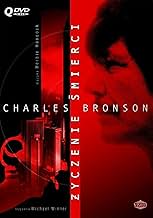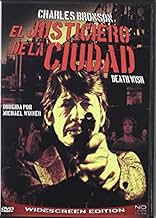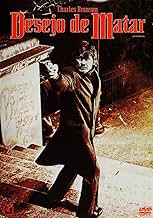अपनी भाषा में प्लॉट जोड़ेंA New York City architect becomes a one-man vigilante squad after his wife is murdered by street punks. In self-defense, the vengeful man kills muggers on the mean streets after dark.A New York City architect becomes a one-man vigilante squad after his wife is murdered by street punks. In self-defense, the vengeful man kills muggers on the mean streets after dark.A New York City architect becomes a one-man vigilante squad after his wife is murdered by street punks. In self-defense, the vengeful man kills muggers on the mean streets after dark.
- निर्देशक
- लेखक
- स्टार
- पुरस्कार
- 1 जीत और कुल 2 नामांकन
- District Attorney
- (as Fred Scollay)
- Lt. Briggs
- (as Ed Grover)
फ़ीचर्ड समीक्षाएं
Charles Bronson is Paul Kersey, a New York architect whose wife is killed by a group of muggers ransacking their apartment, an attack that also leaves his daughter catatonic. The killers are never caught, and Kersey is left shattered.
He takes a job working for a land developer in New Mexico to get his mind off his troubles, and while there his long dormant fascination with guns is renewed when his client Ames Jainchill (Stuart Margolin) shows off his personal collection and lets him crack some shots off. He also witnesses a live reenactment of an Old West shootout, where frontier justice was administered at the end of the gun.
Kersey soon arrives back in New York, livened up a bit from his visit and ready to resume his life. But the streets are still filled with thugs, and Kersey knows that Manhattan is not the best place to be at night. He discovers that Jainchill has given him a .32 revolver as a present, and subsequently uses it to kill a man trying to mug him. Kersey soon realizes the cathartic release of enacting vigilante revenge as the media reports his killings and other private citizens take action, all while police officer Frank Ochoa (Vincent Gardenia) leads a task force to capture the vigilante and stop future violence.
"Death Wish" was a product of its day -- a Nixon-era knee jerk reaction to rampant crime that turned out to be quite a hit. But to dismiss it simply as that would be to deny the film its true power. It asks the question of whether or not vigilantism can be used as a social good, and just how can a citizen properly defend himself from criminal attacks. More importantly, to the movie's credit it does introduce the downside of vigilantism, with Ochoa worrying that people will be whipped into such a frenzy that they'll start attacking anyone who looks suspicious.
The movie does play it safe when it comes to Kersey's "victims" however. Every one of them is clearly a mugger, threatening his life or just wanting his money. But the movie does enter into ambiguous territory by looking at the actual actions Kersey takes. At first he just stumbles into traps set up by muggers or happens on a crime taking place; later on the other hand it's clear that he's actually inviting attacks by making himself a target. And the self-defense aspect of his actions becomes equally cloudy when he kills muggers that are already fleeing. He wants to punish them for their crimes, which itself can be morally troubling.
But to understand "Death Wish" you had to understand the times. Murder rates were very high in New York City, and many muggers had little problem killing their victims. The criminals in the film are not overly sympathetic either, most of them clearly hippies or other social undesirables, probably hooked on drugs from their "free love" days and now stuck in the bitter reality of narcotic dependency now that the good times are over. It's hard to feel sorry for someone willing to kill you just for a couple hours worth of pleasure. I'm sure the movie's audiences in New York, and probably across the country, enjoyed living out their revenge fantasies vicariously through Kersey.
It should be said that Bronson, normally criticized as a wooden actor, gives a remarkably strong performance. This may be due to his friendship with director Michael Winner, who also helmed several of his other films. But it's probably due to the fact that the movie was not written as an action hero vehicle, and because of this the story demanded a character more grounded in reality. Kersey is not a superhero -- he's just one man trying to make a difference in the world.
Also, he's not all there, either. The movie makes it clear that Kersey is a little deranged as well, and one wonders just how far he might go to do what he thinks is right. The sequels were more interested in making him out to be an infallible crusader against evil, abandoning any pretext of social commentary and just offering body counts, but here at least the movie shows that someone willing to go on a shooting spree isn't quite right in the head, regardless of the guilt of his victims.
Supporting roles are excellent as well. A very young Jeff Goldblum nails his performance as one of the muggers who invades Kersey's apartment, immediately scary and repellent. Gardenia is a nice foil for Bronson, making Ochoa an intelligent officer not unsympathetic to Kersey's crusade, especially when he sees how the crime rate plummets following the killings. Christopher Guest, who would go on to star in hit mockumentaries like "This is Spinal Tap," "Best in Show" and "A Mighty Wind" has a small but memorable role as a police officer towards the end of the movie. In fact, everyone does a good job.
Ultimately, your enjoyment of "Death Wish" will probably rely both on your politics and views toward crime. It's a movie where the critic is judged based on his review, which is just as well I suppose. It's at once fascinating, and still very timely.
Nine out of ten stars. Bronson's best solo movie and certainly a very thought-provoking piece, which is lost on both people who only want to watch it for the mugger killings and those who just dismiss it a fascist trash.
New York businessman Paul Kersey (Charles Bronson) is devastated when his wife (Hope Lange) and daughter (Kathleen Tolan) are sexually assaulted in their own home. His wife dies from her injuries and his daughter is so deeply traumatized that she is left in a permanent vegetative state. Kersey tries to get some normality back into his life through work, but deep down inside he's burning for revenge. He knows he will never get the actual gang who harmed his family, but he also realises that crime in general is spreading through the city like a plague. So, armed with a gun and a sense of vigilante justice, he starts patrolling the streets by night, killing muggers, hoodlums and rapists. But for how long can he hand out his own brand of justice without being caught? And at what point does his course of action stop being justifiable? When does he become just as bad as the crooks he is trying to rub out?
The film is based on a Brian Garfield novel, but in the book vigilantism was illustrated as an extension of crime - just another problem as opposed to a solution. Here Michael Winner, a director always happy to create a few ripples, presents the vigilante as an out-and-out hero. The film basically gives a great big nod of approval to Kersey's actions. The sense of humour really helps the film (I still laugh at the scene where some construction-workers kick the hell out of a crook, and one workman nonchalantly states to the TV reporters: "Erm, we roughed him up a bit before the cops arrived!") Death Wish was a pretty influential film for its era, and in spite of its dated air and its morally dubious stance, it is still a great flick. Just make sure you steer clear of its four utterly terrible sequels.
Not only is this the film debut of both Jeff Goldblum and Denzel Washington, it is possibly the greatest revenge film of all time. A mild-mannered veteran -- now working as an architect of all things -- going ballistic? Awesome! I have no idea why I waited so long to see this movie... it kicks all kinds of butt, and presents a very interesting amoral picture. Not immoral, but amoral. Do you cheer him on or hope he gets caught? It is a timeless dilemma.
This is one of my favorite films made from one of my favorite books. I lived in New York during the 1970's and can attest that crime was out of control then, the subways, parks and many streets were no man's land at night where you only went if you really had to or else you wanted to score dope, get a cheap hooker (or be one), or just for the thrill and danger. Police corruption had been so rampantly widespread for so long that there was no law and order and the thugs had taken over the night. If you question this just see Serprico and read that book which details how one honest cop almost died and was nearly buried by the massive tide of corrupt cops he was trying to expose, which was practically all the other cops. The majority of the people lived in fear of being in the streets at night and even many places during the day. Even if you packed heat that was no guarantee of anything, it wasn't uncommon to come across a gang of muggers all carrying guns, knives, baseball bats, etc. Most people in New York then were as Paul Kersey described only worse, not only did they run and hide from fear and danger but they ignored the suffering of others. New Yorkers had developed a reputation as cold and indifferent, which was fairly accurate. I remember a concert in Central Park where a girl was gang banged by a group of guys and hundreds of people just watched it, too afraid, too apathetic, or too vicariously sadistic to get involved. Someone even stole her clothes and she staggered around naked and bleeding in the rain. Things were not good and just about everybody in New York felt angry, alienated and helpless. People were sick of it all, the terrible Vietnam war, corrupt Richard Nixon, corrupt cops, corrupt everything, but they mostly were sick of being afraid and tired of living in fear.
Then the movie "Death Wish" came out. The theater was packed when I went, which surprised me, as I had already read the book and knew what it was about but how did these other people know, besides it was a matinée. I discovered why everyone was there when Paul Kersey shot his first mugger: the whole place exploded in screaming cheers and the cheers got more powerful and louder with each subsequent vigilante act. I had been to Yankees games and concerts where you hear screaming and cheers but nothing had the power of the cheers on that day. There was something wonderfully cathartic taking place, everyone in that audience who had ever been mugged or had been afraid of being mugged, which was virtually everyone, was delighting in having the tables turned. We felt safe, and were happy to see a somewhat soft spoken, average kind of a guy being played by Charles Bronson kick a*s for us, take out the bad guys. This was a new, radical concept back then, an open revenge film where an ordinary appearing guy beats the muggers at their own game. It was a great experience and we all felt like we too could be as tough as Charles Bronson, at least during that safe little reprieve within the theater.
Say what you will about the film, its technical shortcomings, you'd be hard pressed or less than honest to say that Charles Bronson didn't display his international appeal in this movie, the one that made him the world's biggest box office draw. He appears in this movie just like he was in real life, a quiet, unassuming kind of guy who really was tough, not the usual Hollywood tough guy who is so unconvincing because he can't fully hide his physical and character based qualities that are everything but a real, quiet, cool tough guy. Bronson was the real deal, just read about his earlier life if you want to know.
This film got a lot of negative reaction as being a crass and brutal revenge film, and other typical cavalier comments. The New Yorkers who lived it, all the ones I knew and the ones in the theater that day, loved it for what it was, a piece of cinematic magic to make us feel like we weren't afraid and would perhaps very soon never have to feel afraid again. If you've never been mugged or been afraid of being mugged it's very easy to tell others how they're suppose to react, what they're suppose to like, think, do, etc. But until you've lived in a real urban jungle, you'll never know the great release that a movie like "Death Wish" can bring you. It's strictly vicarious entertainment but what marvelous entertainment it is!
क्या आपको पता है
- ट्रिवियाAfter finishing The Stone Killer (1973), Charles Bronson and Michael Winner wanted to make another film together, and were discussing further projects. "What do we do next?" asked Bronson. "The best script I've got is 'Death Wish'. It's about a man whose wife and daughter are mugged and he goes out and shoots muggers," said Winner. "I'd like to do that," Bronson said. "The film?" asked Winner. Bronson replied, "No . . . shoot muggers."
- गूफ़Kersey's first shooting victim is hit in the abdomen, but a police investigator at the crime scene the next morning refers to a bullet hole in his chest.
- भाव
Paul Kersey: Nothing to do but cut and run, huh? What else? What about the old American social custom of self-defense? If the police don't defend us, maybe we ought to do it ourselves.
Jack Toby: We're not pioneers anymore, Dad.
Paul Kersey: What are we, Jack?
Jack Toby: What do you mean?
Paul Kersey: I mean, if we're not pioneers, what have we become? What do you call people who, when they're faced with a condition or fear, do nothing about it. They just run and hide?
Jack Toby: Civilized?
Paul Kersey: No.
- क्रेज़ी क्रेडिटActresses Olympia Dukakis ('Cop at the Precinct') and Marcia Jean Kurtz as Marcia Jean-Kurtz ('Woman at Airport') get credited in opening credits only. There's no mention of them in the closing credits.
- इसके अलावा अन्य वर्जनThe UK version classified in 2006 by the British Board of Film Classification retained the 18 certificate, but all of the BBFC's previous cuts were waived.
- कनेक्शनFeatured in Precious Images (1986)
- साउंडट्रैकDeath Wish (Main Title)
Written and Performed by Herbie Hancock
टॉप पसंद
विवरण
- रिलीज़ की तारीख़
- कंट्री ऑफ़ ओरिजिन
- भाषाएं
- इस रूप में भी जाना जाता है
- El vengador anónimo
- फ़िल्माने की जगहें
- Bear Down Gym, University of Arizona, टक्सन, एरिज़ोना, संयुक्त राज्य अमेरिका(basement firing range)
- उत्पादन कंपनियां
- IMDbPro पर और कंपनी क्रेडिट देखें
बॉक्स ऑफ़िस
- बजट
- $30,00,000(अनुमानित)
- US और कनाडा में सकल
- $2,20,00,000
- दुनिया भर में सकल
- $2,20,00,000
- चलने की अवधि1 घंटा 33 मिनट
- ध्वनि मिश्रण
- पक्ष अनुपात
- 1.85 : 1
इस पेज में योगदान दें






































